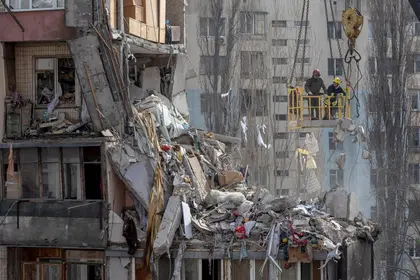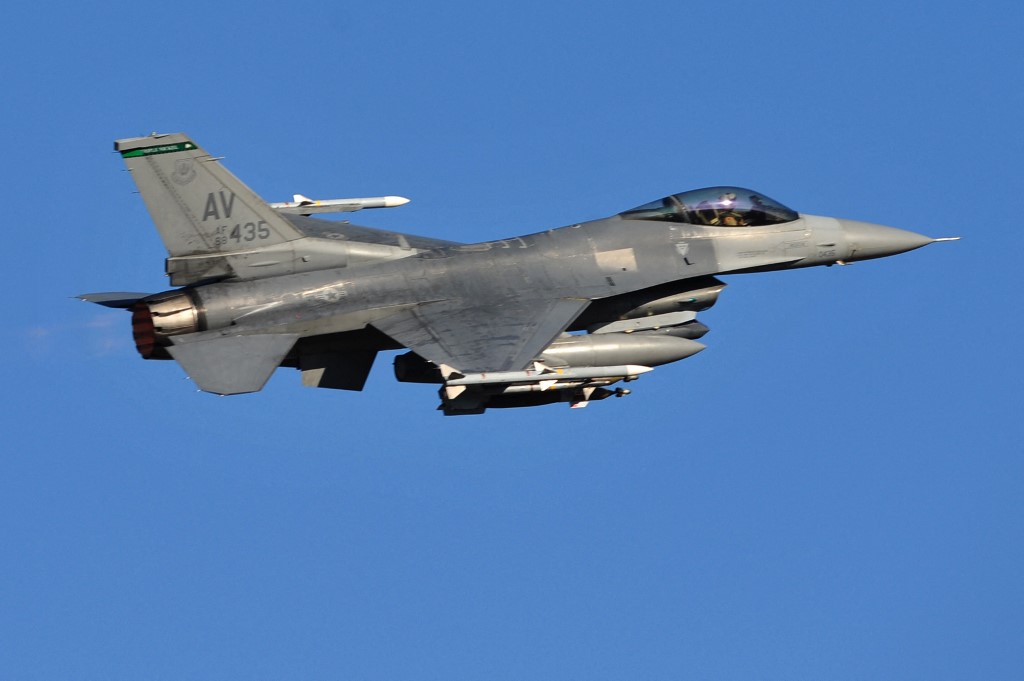Overview:
- More children found dead in apartment building’s rubble
- To keep oil prices on upward trend, the Kremlin and other producers trimmed production
- Russian Foreign Minister at Turkish summit rejects peace negotiations
- Russians advance, if slowly, towards trio of closely watched villages near Avdiivka
- Moscow’s use of glide bombs seems to be on the rise, observers say
Body of 8-year-old found under rubble of apartment building
JOIN US ON TELEGRAM
Follow our coverage of the war on the @Kyivpost_official.
Russian attacks on an apartment building in Odesa have now left 12 people dead, as rescuers continued to comb the debris for survivors. Russian combat drones struck a wing of a residential complex containing 18 apartments on Saturday. At least five children have been reported dead, with others seriously wounded.
Among the dead was an eight-year-old girl named Zlata, whose body was found on Sunday alongside that of her brother, Serhiy, who was 10. The day before, rescuers had discovered the body of a mother, who was embracing her eight-month-old infant.
“This is an indescribable grief for the Odesa region and the whole of Ukraine. Russia is a terrorist country,” wrote Oleh Kiper, the regional head of Odesa’s military administration.
President Volodymyr Zelensky recalled the names of some of the other youngest victims of the attack.
“Mark, who was not even three years old, Yelyzaveta, eight months old, and Timofey, four months old,” Zelensky wrote in a social media post. “Ukrainian children are Russia’s military targets.”
Odesa. The rescue operation at the site of the Russian "Shahed" strike is ongoing. A total of 215 people are on the scene, including rescuers, police, and utility workers. I am grateful to every volunteer who helps.
— Volodymyr Zelenskyy / Володимир Зеленський (@ZelenskyyUa) March 3, 2024
So far, ten people have been reported killed, including three… pic.twitter.com/FU3Qtv28Tt
Russians to slow petroleum output by about one million barrels over three months
On Sunday, Russia’s Deputy Prime Minister Alexander Novak announced that Russia will reduce its oil output by 350,000 barrels a day in April, by 400,000 in May, and then by 471,000 in June, AFP reported.

EU Transfers €1.5 Bln Raised From Russian Assets for Ukraine
The Saudi government and some other OPEC members similarly agreed to reduce production.
“This additional voluntary reduction is aimed at strengthening the precautionary measures taken by OPEC+ countries to maintain stability and balance in the oil markets,” Novak said.
Western sanctions and embargo of Russian petroleum were intended to put a tight squeeze on Moscow’s economy during its invasion of Ukraine, but rising international prices for oil have meant higher profits from its sales to such voracious energy consumers as China and India.
Russia had already agreed to cut production voluntarily by a half-million barrels last year.
Kremlin uses diplomatic forum in Istanbul to bemoan lack of respect for Russian interests
At the Antalya Diplomatic Forum in Turkey on Friday, Russian Foreign Minister Sergei Lavrov turned down Turkish President Recep Tayyip Erdogan’s offer to host peace talks between Kyiv and Moscow, according to the Institute for the Study of War (ISW).
Turkey and Hungary are about the only EU members who have retained open diplomatic channels with Moscow.
Lavrov said that “there are no current dialogue initiatives that consider Russian interests,” ISW analysts wrote. The Kremlin has long complained that no international dialogue about peace in Ukraine has taken into account Russia’s interests.
Along those lines, while in Istanbul, Lavrov also took the opportunity to express the Kremlin’s displeasure that the Moldovan government is “moving in Kyiv’s footsteps,” and claiming that Chisinau is discriminating against Russian speakers in Transnistria.
Operations: Avdiivka
Over the weekend, Kyiv Post had reported, quoting spokespeople from the Ukrainian Armed Forces (AFU), that its troops had slowed Russia’s momentum west of the captured city of Avdiivka; in particular, near three closely watched settlements: Berdychi, Orlivka and Tonenke.
Geolocated footage posted Friday and Saturday, however, indicates that Russian forces had advanced, if slowly, in central and eastern Orlivka, according to the ISW.
Also, verified images published on Saturday indicate that Russian units advanced in Tonenke, while a Kremlin-loyal blogger claimed that Moscow’s forces pushed Ukrainian forces out of Tonenke. Other bloggers denied these claims.
On Sunday, there were no recorded changes of position on these fronts, according to the ISW, although fighting continued around Berdychi, Stepove, and Orlivka. The ISW quoted Ukrainian Tavriisk Group of Forces Spokesperson Dmytro Lykhovyi as saying that defending forces are repelling Russian attacks in the area and that the operational situation in Berdychi, Orlivka, and Tonenke is stabilizing. He added, however, that Moscow’s units have had some “localized successes” in these areas, although none of the towns have been captured.
As strikes hit Dnipro and Pokrovsk, observers say Russian glide-bomb attacks have increased
The Ukrainian Southern Operational Command reported on Sunday that Russian forces launched a Kh-31P missile at Odesa, according to the ISW, but the missile failed and fell over the Black Sea. On the same day, Ukrainian Dnipropetrovsk Regional Military Administration Head Serhiy Lysak reported that Russian forces struck Dnipro City with an unspecified missile.
Meanwhile, Ukrainian Pokrovsk City Military Administration leadership said that unspecified Russian missiles also struck residential buildings in the city of Pokrovsk.
With these air strikes as a backdrop, it is interesting to note that Russian military bloggers are observing that Moscow’s air command has been conducting glide bomb strikes in a “troika,” ISW analysts wrote, using a combination of Su-24, Su-34, and Su-35 fighter aircraft.
The bloggers claimed that Russian forces “recently began conducting more glide bomb strikes because Russia has modernized a large number of standard FAB-250 and FAB-500 bombs and Su-24s and Su-34s with Universal Gliding and Correction Modules (UMPCs), which sharply increased the number of aircraft able to use glide bombs,” the think tank wrote.
You can also highlight the text and press Ctrl + Enter









